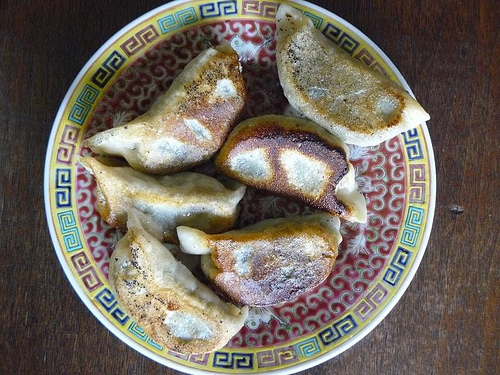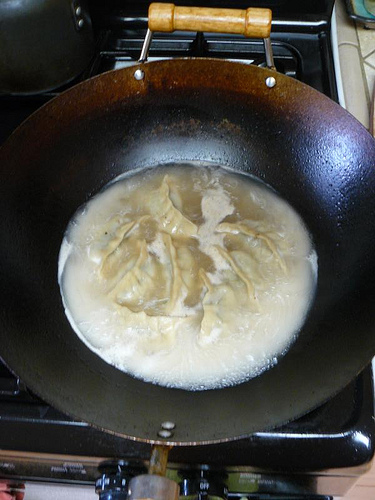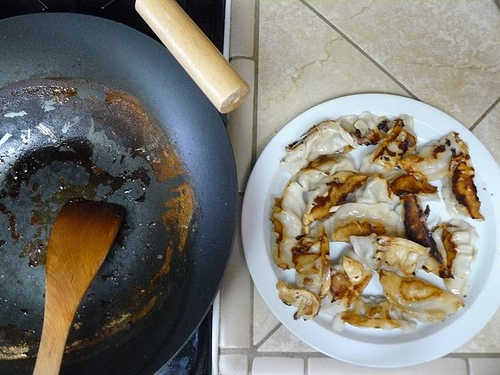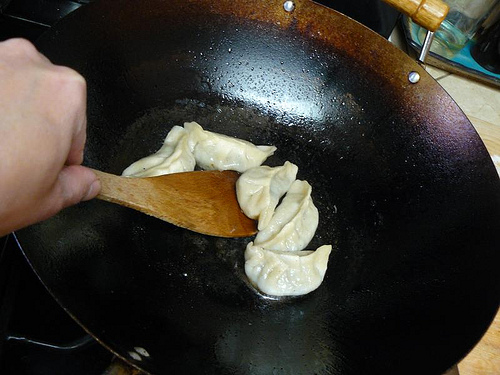
My recent focus on stir-frying and woks got me thinking about how Chinese pot stickers may have first been cooked. As the dumpling legend goes, pot stickers date back to the Song Dynasty (960 – 1280 A.D.). They were initially regular shuǐjiǎo boiled dumplings cooked in a wok (guō) – the multipurpose Chinese cooking vessel. The chef cooking them forgot about his dumplings. After the water had boiled away, the dumplings stuck (tiē). He didn’t know what to do so he pried them from the wok and served them.
His guests loved the contrasts between rich filling, tender skin, and crusty bottom. Thus the pot sticker was born. The Mandarin name for pot sticker is guōtiē, which literally means wok sticker.
I was a brazen dumpling maker last week. After improvising a filling from leftover steak and bok choy, I prepared my basic dumpling dough and shaped a batch of dumplings. Instead of pan-frying them in a nonstick skillet as usual, I decided to use the wok. It was sitting out from all the stir-frying I’d been doing from Grace Young’s great new book.
Wok Sticker Trials
The experiment helped me understand why pot stickers are cooked they way they are today. The photo at the top of this post is of my wok stickers. You can see the flecks of wok patina that got caught onto the dumpling wrapper. I didn’t foresee that unintended consequence from using my well-seasoned wok. The dumplings stuck and I had to use a water and wooden spatula to detach them from the wok bottom. It was a slight struggle.
Then I tried some old frozen dumplings in a nonstick wok and that stuck too:
On the third round, I got smart. I put a scant inch of water into the wok and drizzled in a good tablespoon of oil. When the water came to a simmer, I added some dumplings, shaking them around a bit at first.

Then I walked away to make the dipping sauce and set the table. About 10 minutes later, the water was boiling fast and furious and looked thick as it reduced to nothing. There were loud popping, sizzling noises.
After the opaque liquid had disappeared, the oil I originally added went into action, frying the dumplings. What I didn’t anticipate were all the bits of hot oil spewing onto the floor. Using my body as an oil shield didn’t work. I couldn’t put a lid on the wok as I had to let the dumplings cook. It was an experiment. I was pretending to be the Song Dynasty chef.
Finally, I turned off the heat and let the cooking subside. The second round of wok stickers stuck but not as much as the first time around. I successfully got all of them out of the wok with only one broken dumpling.
Wok Stickers vs. Pot Stickers
What was noticeably different was that the dumpling bottoms cooked unevenly. Look at the photo at the top. Notice how some are dark brown and others not.
At the table, my husband commented that the dumplings looked flatter than normal. The wrapper was also soft, not chewy-tender like usual. Regardless of looks and texture, we ate all of them.
However, I realized that you usually you poach Asian dumplings in lots of water but in the case of the wok sticker, there is a lot more moisture going into the skin. The water had to have boiled off but a lot more than normal got absorbed into the wrapper. That extra moisture softened the wrapper a tad too much. It also caused the wrapper to lose too much of its elasticity, which is why it didn’t proudly sit up.
So the Song Dynasty chef’s accident was obviously refined over time to arrive at what we know today as the pot sticker. The modern way to mimic and improve the ancient mishap is to cook pot stickers in a skillet with a little water and oil, which steams the dumplings and fries their bottoms to a golden, toasty finish.
An outline of how pot stickers are cooked is as follows:
- Pan-fry the dumpling bottoms till crisp
- Add a little water (about ⅓ cup)
- Cover to steam and cook
- Remove the lid when the water is gone
- Let the dumplings pan-fry to re-crisp the bottom
Deliciously ingenious Asian dumplings!
Tried cooking pot stickers in a wok? Share your insights and tips.



















Vivian says
Trial and error 🙂 some of the best things to land on our table have been happy accidents. I love this story of how the pot sticker came y
to be. Thank you for sharing it with us
Health Insurance says
I like this golden brown not over cook any ways still looks delicious.
Chelsea says
I enjoyed reading about this, Andrea. I appreciate you posting these "pearls" for us to learn from as you explore all the different ways dumplings can be enjoyed!
Eleanor Hoh (WokStar) says
I so agree with Chelsea's comment. Full disclosure, I am a cast iron wok advocate and was introduced to using it by my mother. I now market a cast iron wok set so of course I am going to suggest that a cast iron wok would not only fry your dumplings with a nice crispy crust but won't stick. I am going to do it and take photos but I am not making my own wrappers. I'd also like to suggest using a Chinese spatula which has a thin edge which will help scoop under your dumplings without breaking them.
Instead of frying dumplings which you can only fry a few at a time, I broil under the grill. I boil the dumplings first, then dry them out and then grease a baking tray and grill under the broiler. They turn out PERFECTLY with nice, crispy tops and the underside is still soft. You can grill a whole batch, less work. I'll do a post and let you know.
Andrea Nguyen says
Ladies, glad you enjoyed reading about my dumpling adventures! Another thing I learned was that even 'bad' dumplings still taste good.
Eleanor, do let me know when you grilled dumpling post. I should have used a metal spatula but I just grabbed a thin wood one. In a 12-inch skillet, you can cook about 14 dumplings at a time.
Julie Evans says
Hi Andrea
Does that mean the amount of water you use to make the dough for the pot-sticker and the dumpling (you boil in water) should differ, ie the guotie using less water?
Thanks
Julie
alan says
usually i heat up a pan, put some oil/fat in the pan, put the pot stickers in, then throw in half a cup or so of water, then put hte lid on, after a few minutes, once all the liquid is gone, remove lid, let hte remaining liquid evaporate, its usually perfect, cooked through, and crispy on the bottom, once its crispy it usually doesnt stick to the pan
the movie addict says
the dumplings look so so yummy..im totally having dumplings for lunch later
JOE says
ILIKEPANCAKES!!!
JOE says
THIS ISNT A PANCAKE
supra shoes says
The sun illuminated the backside of the funnel bright orange at times, as the strong tornado moved over a lake on one occasion. The surface of gravel roads were scoured off, large farm equipment was flying through the air, and high tension power structures were knocked over and twisted. Thankfully no one was hurt from this tornado, as it mostly remained over open terrain
Carol says
Looks delicious! Don't you just love these mouth-watering accidents?
mbt online says
That was my thought,too.
Canada Goose Parka says
Power invariably means both responsibility and danger.
marlon says
its usually perfect, cooked through, and crispy on the bottom, once its crispy it usually doesnt stick to the pan.